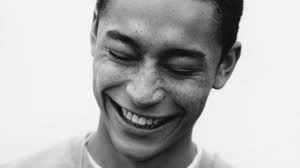While comparisons have been drawn between Loyle Carner’s mellow, sample-heavy hip-hop and that of American artists such as J Dilla and Slum Village, his warmth of tone and lyrical directness keeps his sound firmly rooted in the UK. He agrees that American hip-hop has played a key role in his musical upbringing, along with forerunners of the UK scene (Jhest, for example) but admits that essentially he “grew up on grime”. When I ask him where he feels his music sits between the transatlantic traditions he recalls the beginnings of this creative dualism and suggests he’s not too bothered about affiliating himself with any particular scene, “when I was little my mum bought a Skybox and I would constantly flick between MTV Bass and Channel U.” He will have been witness, then, to grime’s slow but steady emergence from the confines of this cult satellite TV channel into the realms of commercial and international recognition. Since Wiley’s 2008 crossover hit ‘Wearing my Rolex’ he, along with Dizzee Rascal, Tinchy Stryder and Boy Better Know, has become a recognizable face to your average Top 40 follower. Last month Drake went so far as to get a BBK tattoo on his shoulder to eternalize his love for the collective, after Skepta’s (absolute banger) ‘That’s not Me’ caught his attention last year. Carner “can’t put his finger” on this sudden frenzy, but suggests that the “raw, honest” nature of grime is “very different to anything that Americans have”, and it was only a matter of time before something so prominent in subculture was going to “bubble over”. This raw honesty is something Carner has translated into his own music. While his lyrics are intelligent and poetic, he isn’t afraid to be brutally direct with his message instead of shrouding it in metaphor. This is especially powerful in ‘BFG’, a track where he dwells on the pain and frustrations of loosing a parent “Everyone says I’m fucking sad/ Course I’m fucking sad/I miss my fucking dad”. I suggest that to obtain success commercially with grime or hip-hop one might be obliged to make creative sacrifices, and try to assimilate a more ‘pop’ sound (alluding to the obvious disparity between the likes of Wiley and Tinchy Stryder’s solo chart hits and the early work of their former collectives Roll Deep and Ruff Sqwad), and he is quick confirm that he’s not interested in any sort of musical compromise. “Nah, none of that. I’m just gonna keep doing what I’m doing and we’ll see.”
Carner’s fellow Brit School alumna Adele is currently number 1 in the UK charts with ‘Hello’, a big ol’ ballad belter in which Adele almost parodies herself in her reluctance to diverge from her 100%-success-rate hit-making formula. Snide jibes aside; I really am perpetually frustrated with the repetitiveness of the British music charts, and the unwillingness of consumers to invest in new music. Carner, far less cynical than I, argues people are still buying Adele’s music because “she does it so well. She’s heartbroken all the time. It’s so familiar and relatable.” Indeed, Adele’s exploitation of such commonly applicable themes is bound to tug on heartstrings, but I can’t help but feel that Carner’s intensely personal lyrics are relatable in a much more poignant way; engaging in subjects that might be unfamiliar to the listener, but writing with such bold honesty that we are absorbed in their nostalgia and given space to reflect. This is why, despite conceding that his sound is inextricably entwined with South London (even tenderly immortalising his grandparent’s home in ‘Tierney Terrace’) and that place is “pivotal” to his work, Carner is hopeful that his music can translate and be universally appreciated “I get messages from people in America and Australia. I haven’t done any shows there yet but wherever I’ve been so far it always goes down well.” Understandably, as many of the tracks draw on very recent, painful experiences, they can be “exhausting and emotionally demanding” to perform live, but Carner fearlessly refuses to take the emotion out of the performance “some nights I can get really caught up in it, especially if my mum is there… but that makes it more special.”
When I ask him if he thinks there is a sound to define our generation, he settles on “melancholy… coz of the greyness. The life of an average student – the amount of work you have to do to achieve not much”. This pensiveness could be interpreted as gloom, and considering Carner’s experiences and the reflectiveness of his music one could be forgiven for attributing him this disposition. But, like his music, Carner doesn’t really fit into just one box. And the overarching impression I get from our chat is of an artist who is positive (the delight in his voice is clear when he describes writing and recording ‘Guts’ with “idol” Kate Tempest, who has now become “a good friend…which is weird”), productive and even more excited than the rest of us for what’s to come.
Loyle Carner plays Headrow House on Thursday 12th November
http://crashrecords.co.uk/product/loyle-carner-121115-headrow-house/
http://www.seetickets.com/event/loyle-carner/headrow-house/907397
http://www.leedsgigtickets.co.uk/tickets/43727
Charlotte Bickley

